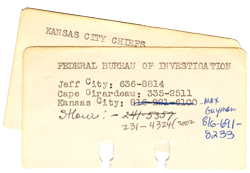 One of the reporters in one of our newsrooms has a Rolodex that goes back 30+ years. The cards are worn from handling and yellowed by the years. I have no idea if he also maintains some kind of computer file as well. Doubtful.
One of the reporters in one of our newsrooms has a Rolodex that goes back 30+ years. The cards are worn from handling and yellowed by the years. I have no idea if he also maintains some kind of computer file as well. Doubtful.
A well-maintained Rolodex was once the most valuable thing on a reporter’s (or salesman’s) desk and the one thing to take with you when the time came.
It’s from a time when the telephone was the sole means of instant communication but not yet smart enough to remember more than a half-dozen numbers (“I’ve got you on speed dial”).
I wonder how many fewer calls are made in our email world. Has Outlook become the new Rolodex? Or has our mobile phones absorbed that function? Losing your phone is only a big deal because it might mean losing all of the numbers of friends and contacts.
Which brings us to social networks.
Will being able to communicate with you –by calling or emailing– become less valuable than having you “friend” me on Facebook or “follow” me on Twitter. The difference is me seeking your attention versus you deciding to give me your attention.
Let’s say you’re a salesman for a paper products company. Let’s call you Stanley. You have the phone number and email addresses of your 20 largest customers. With a little time and patience, you can get them on the phone; get a reply to an email; and even get an appointment.
But suppose those customers elected to follow your Twitter feed because that’s where you posted links to information that they found valuable enough to give their attention. I submit it is a different –more valuable– kind of attention than you get when you punch through with a call or email.
One last example. I can call or email the senior management of our company. Most of them are in the same building, so I can walk down the hall and usually get some face time. But a couple of them read my blog and –in time– will follow my Twitter feed. And the only reason they would invest even a minute or two from incredibly busy days, is they perceive some value (information or entertainment).
Being in someone’s network is far more valuable than being on their call-back list. Or in their Roladex.

All of these channels of communication can serve as a contextual undercurrent for our interactions. The fact that I know the shared minutae of your life doesn’t constitute something important in and of itself, but rather acts as a sort of carrier wave for more significant interactions.
This omnipresent interpersonal zeitgeist lets us pick up threads of conversation that never end, but simply change orbits to higher or lower levels of energy. In the olden days, these levels existed but not in so many bands and not in such a fine level of granularity or accessibility. I could write a letter, make a phone call, or show my face… but all of these interactions are more punctuation than undercurrent, held apart by long stretches of blankness where my naked eyes and ears were unaware of anything beyond 500 meters.
I have been in the world only long enough to experience those very last dark final days of isolation in a life of crude, chunky communication. Instead I get anxious now when some part of my sensorium is not being artificially expanded. What must it have been like to be so alone all the time? Maybe the inner dialogue was richer. But then, who would you share it with if it were? It gives me the willies.